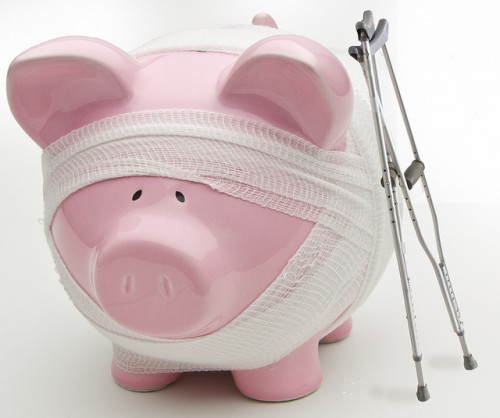Personal Bankruptcy: An Overview of Your Options
Posted by : Premraj | Posted on : Thursday, May 15, 2014

Photo teegardin
Do you know why most of us are convinced having more money would make us happy? Because lack of it can cause us great suffering. Not having enough to pay our bills, or worrying what would happen if some emergency popped up which we don’t have the funds to cover can easily gnaw at us, and lead to many sleepless nights.
Far too many people find themselves in dire financial straits and can’t possibly see a way out. Maybe an unexpected illness left you drowning in medical bills. Maybe you lost your job, and in order to get by, were basically living off your credit cards, and this went on way longer than expected. Maybe you were not instilled with financial savvy, and were just plain irresponsible with money.
If you are left with an amount of debt that seems impossible to pay off in any reasonable time frame, you know all too well the mental toll this can take—the amount you owe rolling around in your head constantly ; not being able to sleep; screening calls from creditors. If this sounds like you, it might be time to start researching information on bankruptcy to see if this might be the way to resolve the issue. The following is meant to provide a basic overview of your options for personal bankruptcy.
What is Bankruptcy Exactly?
On a basic level, Bankruptcy is a federal process that aims to help individuals and businesses either get rid of debts completely, or create a repayment plan through bankruptcy court. Once you file for bankruptcy, creditors are no longer able to contact you requesting payment, unless the court permits them to do so by lifting the ‘automatic stay’ that does into effect once you file.
Not all debts are eligible for discharge. Examples include student loans, alimony, child support, and som kinds of tax debt. Student loans can possibly be discharged if you can show paying them would create an ‘undue burden,’ but this is rare. There is always a possibility you will be held responsible for other types of debts if the creditor can convince the court it should not be discharged.
Types of Bankruptcy
There are two types of bankruptcy. Chapter 7 allows for the discharge of all eligible debts without you having to repay any portion. You must meet certain criteria to qualify for this form of bankruptcy. The first factor is your income, and whether it is less than the mean income for your family size in your particular state. If your income is below this, you will qualify for Chapter 7. If your income is higher, you must take the ‘means test,’ which examines your income and expenses to determine if you have sufficient funds to pay off your debts. There are some exceptions to having to pass the means test if your income is higher than the median, such as the majority of your debts being non-consumer. You are typically allowed to keep most types of property, such as your home (provided the equity does not exceed a certain amount in some states), vehicle, retirement accounts, public benefits, personal property
If after taking this means test, it is determined you have enough disposable income to repay your debts, or you are not eligible for any exceptions, you would look into Chapter 13 bankruptcy.
Under this process, you set up a repayment plan with the bankruptcy court to pay back all, or a portion of, your debt within a certain within three to five years. How long will depend on several individual factors, such as the amount of money you owe, and your income. To qualify, your debts must not exceed a certain amount, your tax filings should be up to date, and you must show proof you have sufficient income to repay the debts.
Which Should You Use?
Like it was mentioned above, if your financial situation dictates, you may have no choice but to use Chapter 13 if you meet eligibility requirements. But, if you do qualify for Chapter 7, that might not necessarily be the best option for your particular circumstances.
If you are behind on mortgage or car payments, for example, and you hope to catch up on payments over time, and eventually reinstate the original loan terms, you would not be able to do this with chapter 7. If you have a codebtor on any of your debts, filing Chapter 7 will likely leave them on the hook as creditors are likely to go after them next—if you file 13, and make your payments, they will not try to get this money from your co-signer. If you have any property that would not be exempt from sale in Chapter 7, filing 13 would protect it.
One thing to keep in mind with Chapter 13, is in order to have any remaining debt discharged that would remain upon completion of the plan, you must complete the entire repayment plan. A lot of people don’t. And unless the court lets you off the hook for some extreme hardship, your debt can be reinstated.
If your financial situation is causing you to feel depressed, and you are seriously concerned you cannot meet your obligations, it may be time to talk with a bankruptcy lawyer to discuss your options.
Photo teegardin
 SU
SU REDDIT
REDDIT







